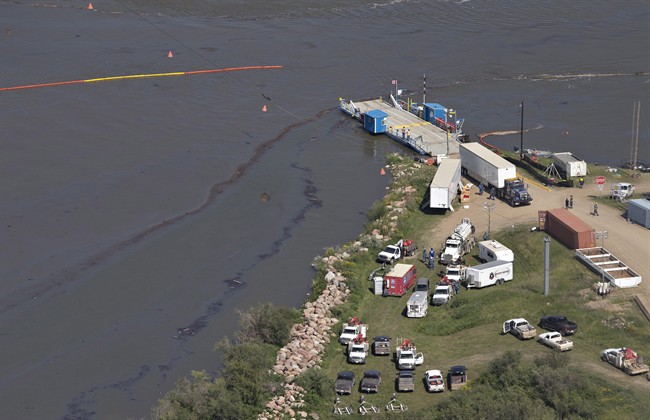The regulatory agency in charge of approving and monitoring oil pipelines in Canada is looking to improve its backup plan in case an energy company is unable — or unwilling — to respond to a spill.

The National Energy Board (NEB) recently put out a request for information seeking input from companies that might want to act as a fall-back in these situations. The board says it wants to “augment” its ability to assume control in an emergency.
“The NEB is seeking information from interested companies that have the capacity, capability and availability to support the NEB’s response to pipeline incidents on a regional, provincial or national basis should a designated company be unable or unwilling to respond,” the document says.
READ MORE: Oil spills common in Saskatchewan, though usually small
NEB spokesperson James Stevenson explained that in the event of a rupture or spill, the new Pipeline Safety Act (which came into effect June 19) allows the government to step in if a company doesn’t have the financial or material resources to clean things up, or if it doesn’t comply with an NEB order related to the spill.
In these cases, the NEB can then “take any action or measures it considers necessary in relation to the (spill) or authorize a third party to do so,” Stevenson said.
It’s that third party they are now looking to find.
“In the unlikely event that the NEB should have to assume control of an emergency response, these services could be called upon to assist our response efforts,” Stevenson told Global News. “To date, the NEB has not had to assume control of an emergency response.”
Stevenson said the request for information, published on the government’s main procurement website, “is simply a precautionary measure,” and was not issued in response to any specific incident or spill.
But it does come in the midst of a major spill in Saskatchewan that has threatened to contaminate the drinking water of thousands of residents.
Watch below: Oil spill in Saskatchewan continues to affect the drinking water of almost 70,000 residents

Last Thursday, July 21, Saskatchewan’s provincial government was notified by Husky Energy that more than 200,000 litres of oil had spilled from the company’s pipeline on the edge of the North Saskatchewan River. The company is cooperating in the cleanup.
READ MORE: Husky Energy changes day it discovered Saskatchewan oil pipeline spill
The NEB already has a comprehensive Emergency Management Program which can include a field response, Stevenson explained, but the new backup plan would add an extra layer of protection.
“Any time there is a serious incident on an NEB-regulated energy facility, NEB staff will attend the site to oversee the company’s immediate response,” he added.
“We require that all reasonable actions are taken to protect employees, the public and the environment. Further, the NEB will verify that the regulated company conducts an adequate and appropriate cleanup and remediation of any environmental effects caused by the incident.”
The NEB was taken to task last winter by federal Commissioner of the Environment and Sustainable Development Julie Gelfand, who found that while there had been improvements in recent years, the agency was still failing to “adequately track companies’ implementation of pipeline approval conditions,” and “not consistently following up on company deficiencies.”


Comments